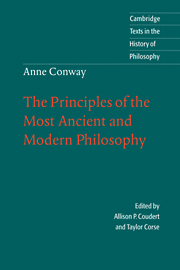Book contents
- Frontmatter
- Contents
- Acknowledgments
- Introduction
- Chronology
- Further reading
- Note on the text
- The Principles of the Most Ancient and Modern Philosophy
- Unpublished Preface by Henry More
- Published Preface
- Chapter I
- Chapter II
- Chapter III
- Chapter IV
- Chapter V
- Chapter VI
- Chapter VII
- Chapter VIII
- Chapter IX
- Index
- Cambridge Texts in the History of Philosophy
Chapter II
Published online by Cambridge University Press: 18 November 2009
- Frontmatter
- Contents
- Acknowledgments
- Introduction
- Chronology
- Further reading
- Note on the text
- The Principles of the Most Ancient and Modern Philosophy
- Unpublished Preface by Henry More
- Published Preface
- Chapter I
- Chapter II
- Chapter III
- Chapter IV
- Chapter V
- Chapter VI
- Chapter VII
- Chapter VIII
- Chapter IX
- Index
- Cambridge Texts in the History of Philosophy
Summary
S. 1. Creatures, although they are not coeternal with God, nevertheless have existed for an infinite time from the beginning. S. 2. Thus, no number of years, not even the greatest that the created intellect could imagine, can arrive at the beginning of their creation. S. 3. In different senses, creatures have existed and not existed from eternity. S. 4. The infinity of time is confirmed by the infinite goodness of God. S. 5. The essential attribute of God is to be the creator. S. 6. What is time and why it is not in God.
S. 1. All creatures simply are and exist only because God wishes them to, since his will is infinitely powerful and his command, without any help, instrumental cause, or matter, is alone capable of giving existence to creatures. Hence, since the will of God is eternal or from eternity, it follows necessarily that creation results immediately, and without any interval of time, from the will to create. And yet it cannot be said that creatures considered in themselves are coeternal with God because then eternity and time would be confused with each other. Nevertheless, creatures and the will which created them are so mutually present and happen one after another so immediately that nothing can intervene, just as if two circles should immediately touch each other. Nor can we assign to creatures any other beginning than God himself and his eternal will, which agrees with his eternal idea or wisdom. The natural consequence of this is that time is infinite from the moment of creation and has no quantity which the created intellect can conceive.
- Type
- Chapter
- Information
- Publisher: Cambridge University PressPrint publication year: 1996

